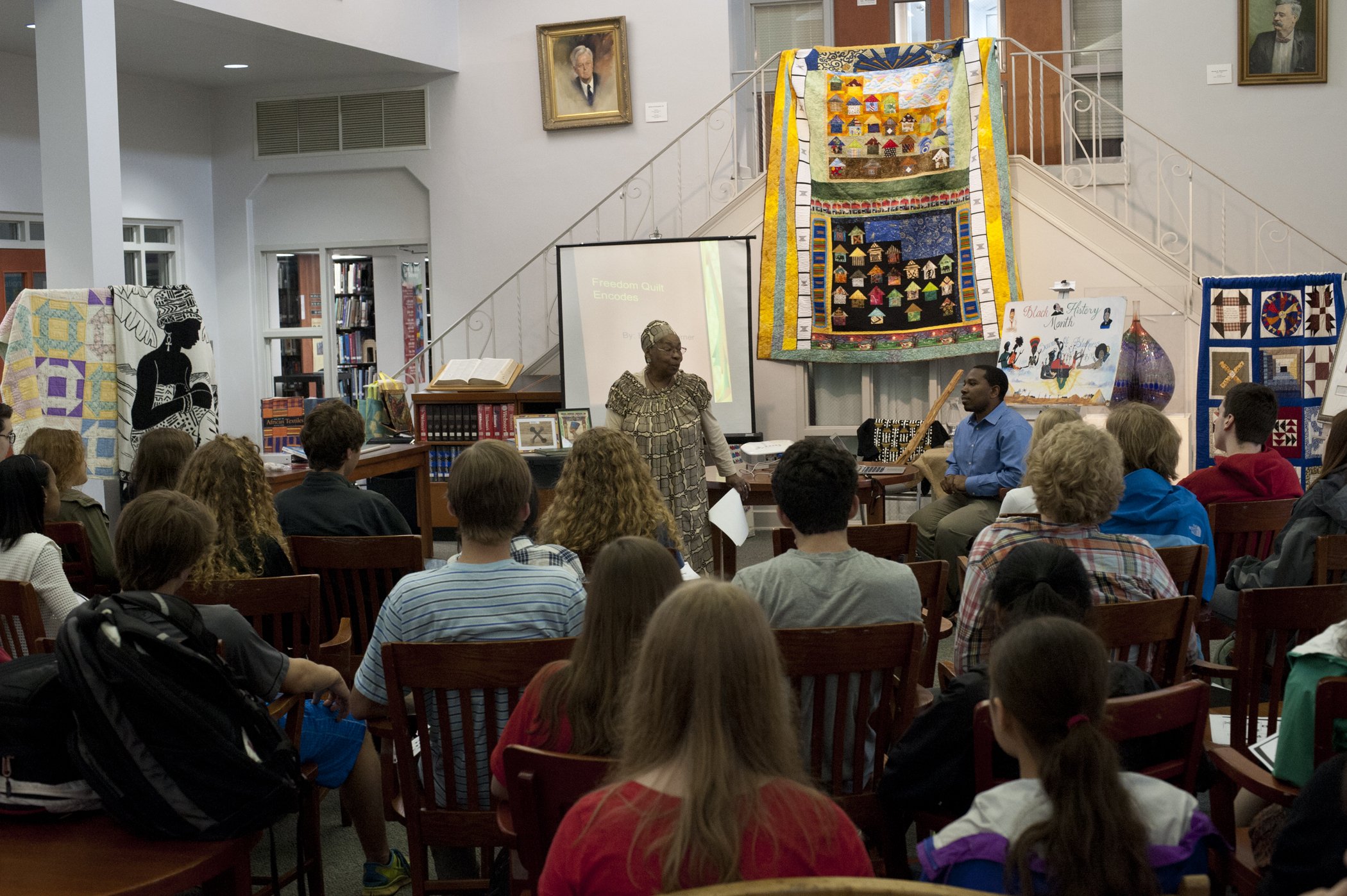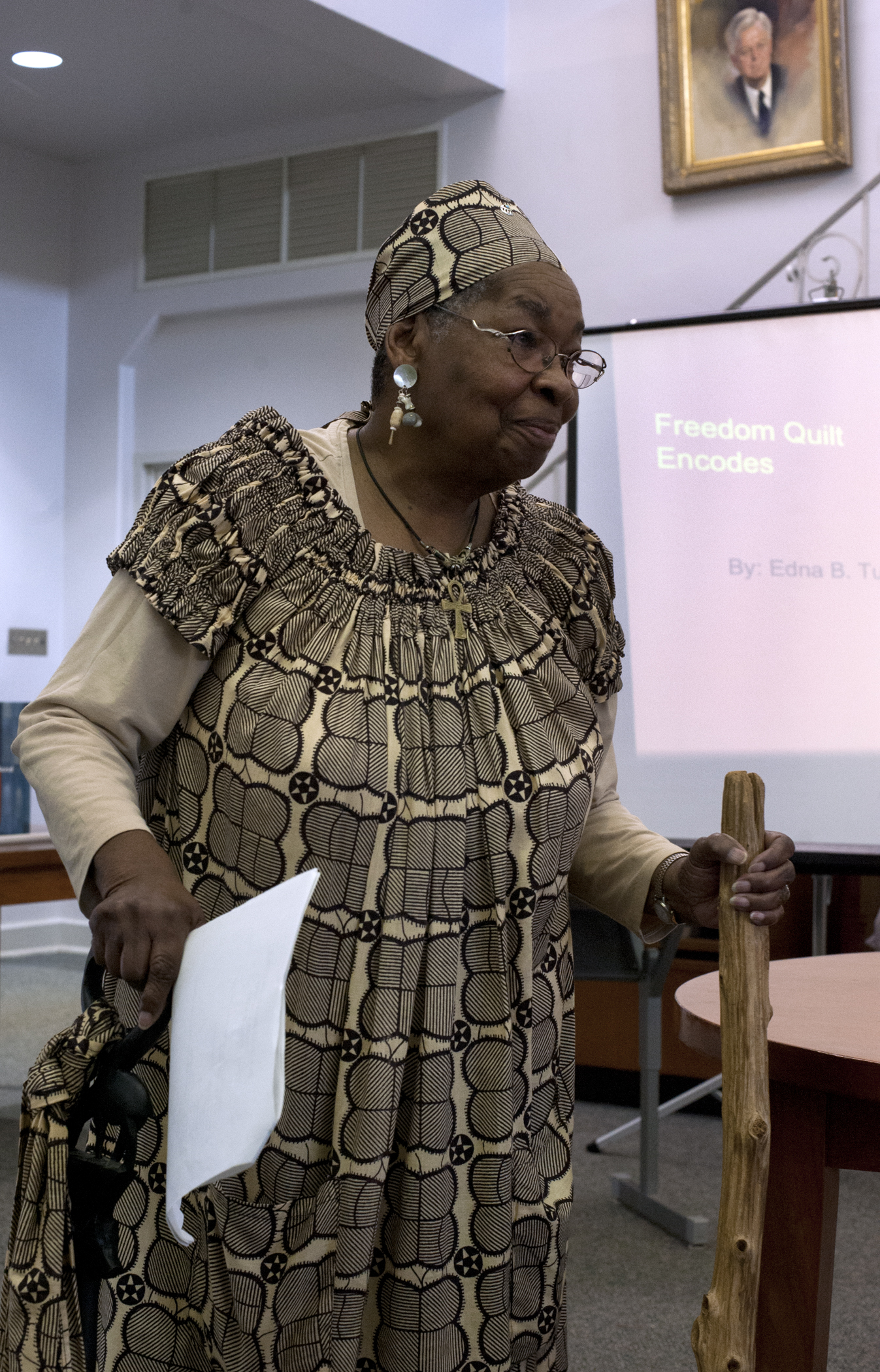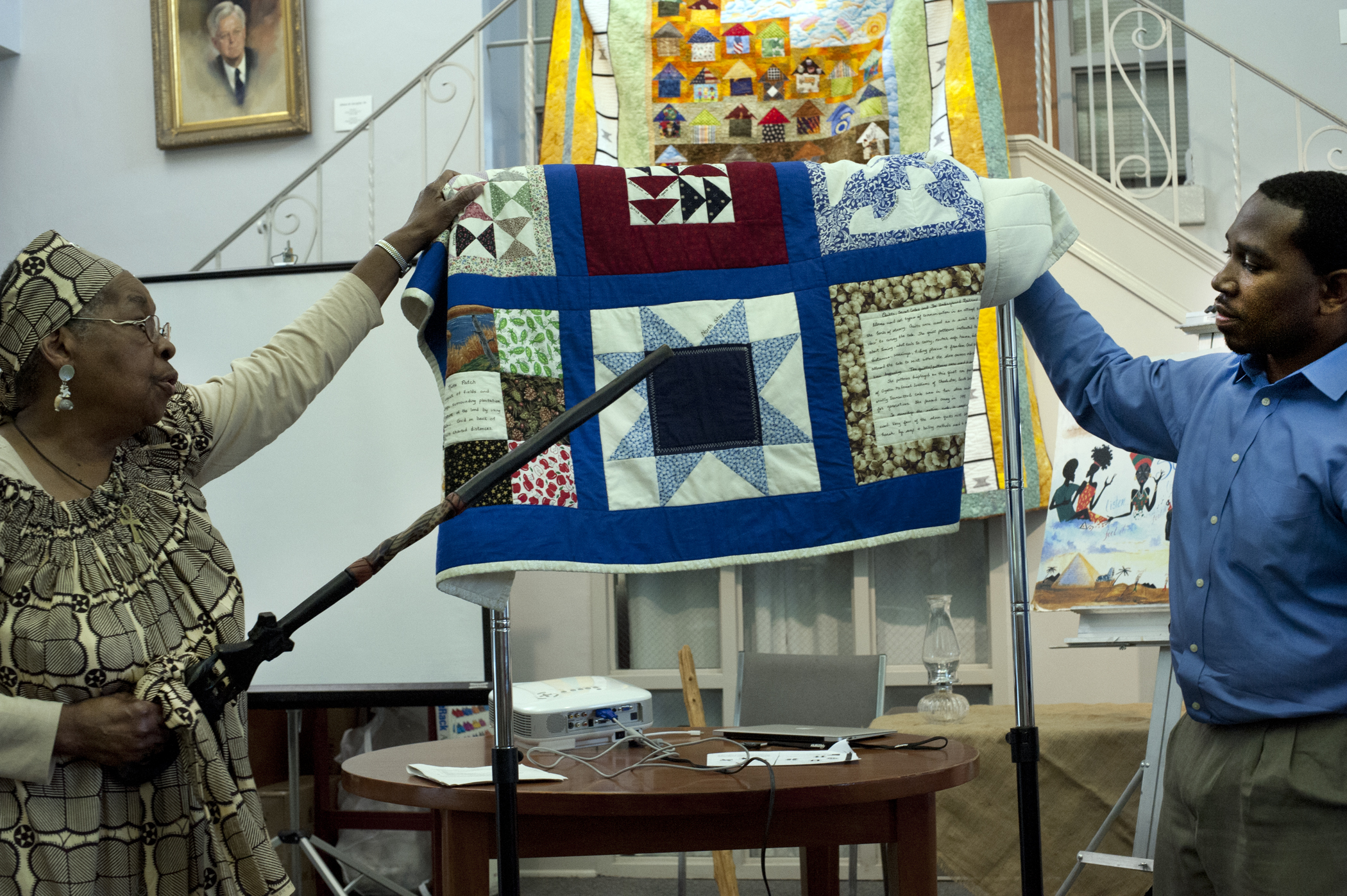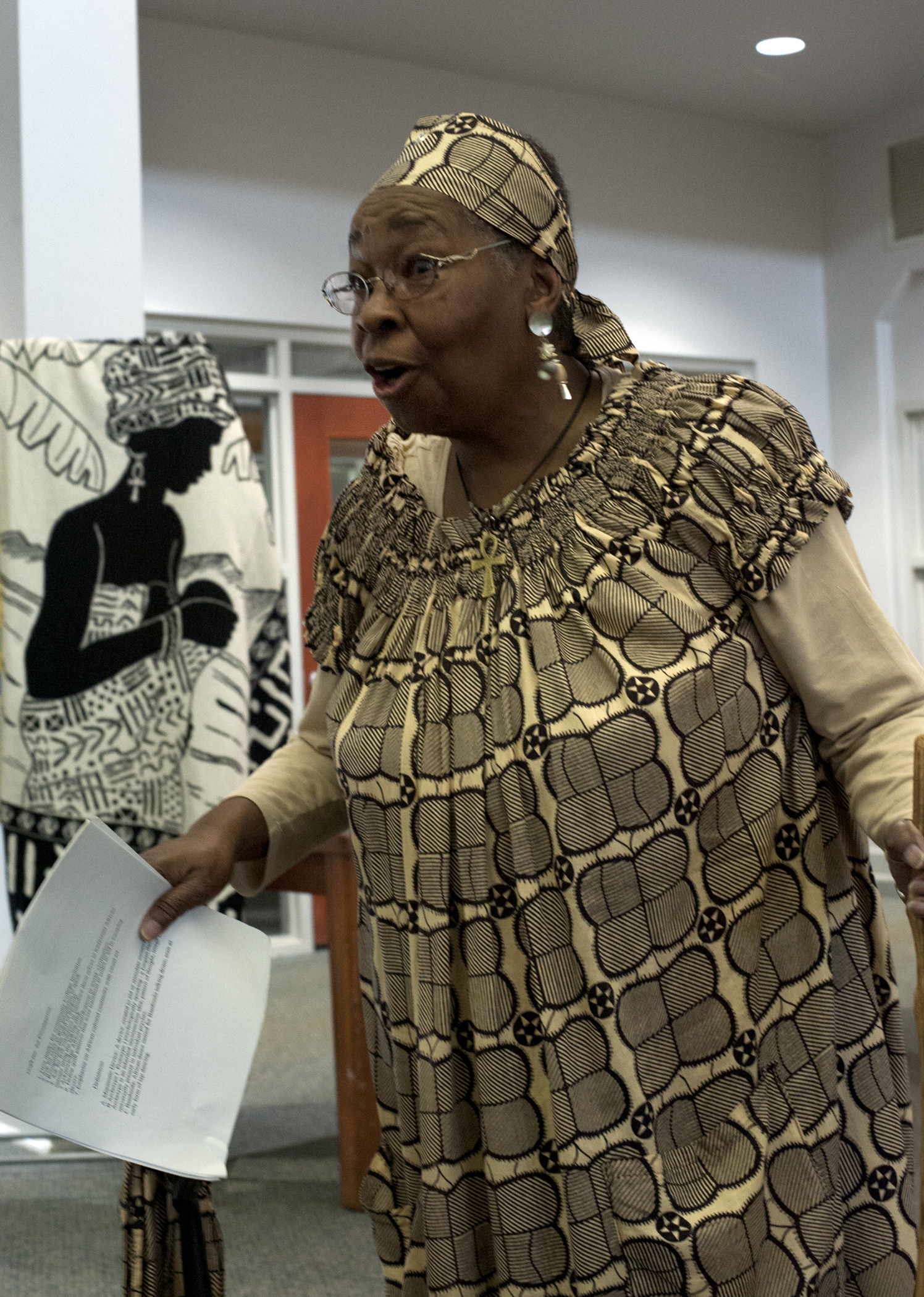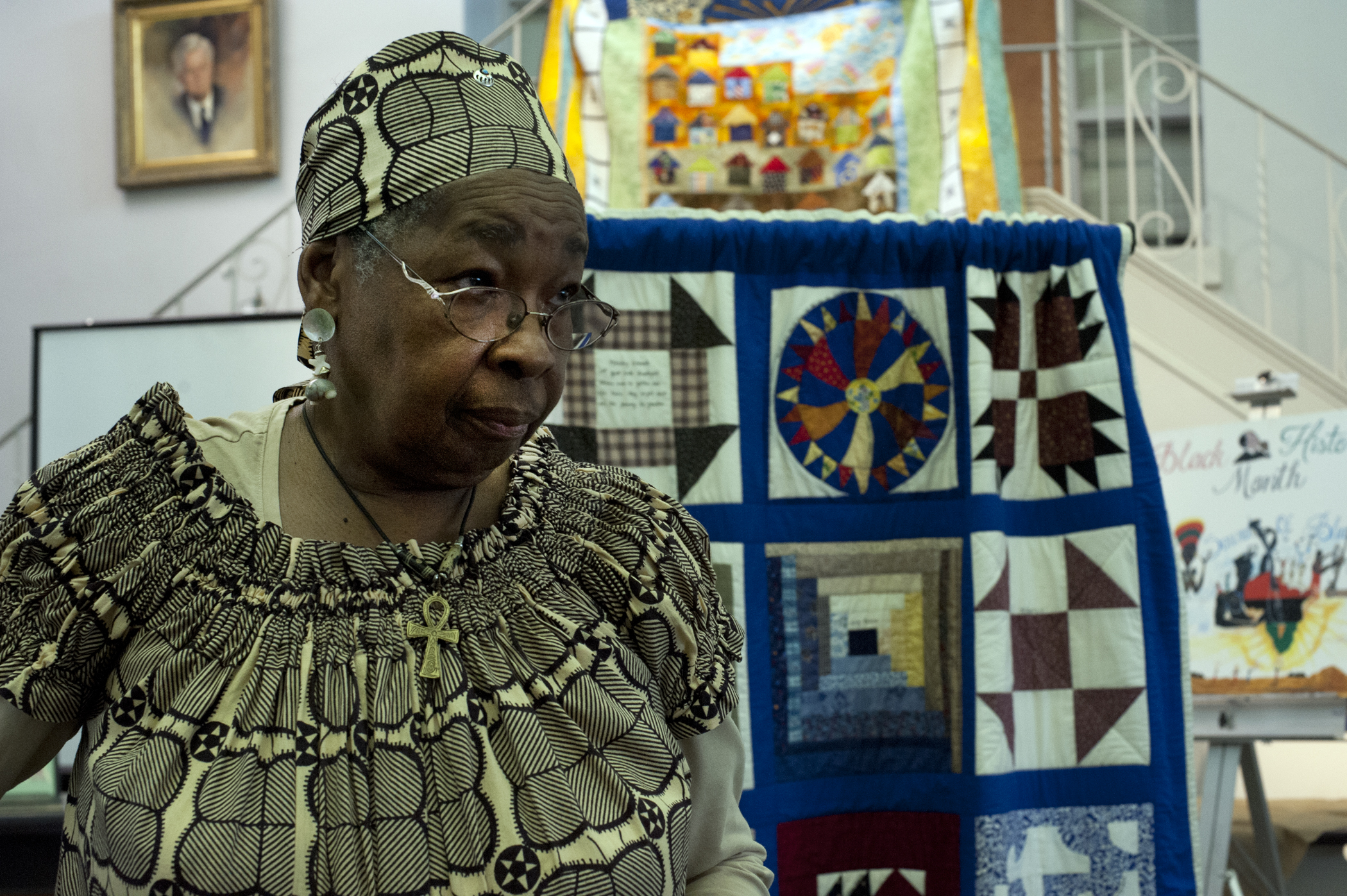In Search of {my grandmother’s} Garden
D’Anthony M. Allen
Mr. Allen’s grandmother, Ms. Turner, speaking to Indian Springs during the 2014-15 “Art Fuels” talk series.
“Virginia Woolf, in her book, A Room of One's Own, wrote that in order for a woman to write fiction she must have two things, certainly: a room of her own (with key and lock) and enough money to support herself”(Walker).
As I was teaching one of Alice Walker’s most important essays, “In Search of Our Mother’s Gardens”, I began to reflect on the many women, the giants on whose shoulders I now owe much of my success. In my attempt to simply reflect, my mind reacted in verse.
My ancestors were royalty, women warriors and magnificent men of might, at the height of their reign, they practiced medicine, not mysterious magic, No these Magi of Morocco were performing surgical procedures of advancement. Not just diviners, Doctors, Dentists, Chemists lived in Ancient Kemet
They experienced heightened levels of enlightenment, Deists, Monotheists, constructed geometric cathedrals so elaborately raught, that no architectural genius could reproduce the pyramids
They realized society needed order, so they organized the culture. Therefore, when eyeing the ivory coast, know those eyes looked to the skies the most: astonishing astronomers and navigators who set sail, but were poor negotiators who set sales on their tribal opposers
My Relatives became the possessors of my Ancestors. Prosessions of property paid in- full. Relatively speaking, I'm related to the slave captors, slave masters, and slave actors. They all won Oscars for their supporting roles in our survival
Conceived in sin, my European kinsmen forced themselves on my queen mothers, then forced my black brothers to procreate profits, not people because that connotes an equal.
But my prophets disposed me of the lies my teacher told me.
Mrs. Walker asks, “What then are we to make of Phillis Wheatley, a slave, who owned not even herself? This sickly, frail, Black girl …who, had she been white would have been easily considered the intellectual superior of all the women and most of the men in the society of her day” (Walker). She continues along that same thread when she writes:
But at last, Phillis, we understand. No more snickering when your stiff, struggling ambivalent lines are forced on us. We know now that you were not an idiot nor a traitor; only a sickly little Black girl, snatched from your home and country and made a slave; a woman who still struggled to sing the song that was your gift, although in a land of barbarians who praised you for your bewildered tongue. It is not so much what you sang, as that you kept alive, in so many of our ancestors, the notion of song. (Walker)
Black history month began in 1926, and most of the people we celebrate today weren’t even born before then! Yet, within their throats grow reverberations of the song. But it’s interesting that Maya Angelou taught me all about what George Washington Carver and went through in order to become great. He was a bootblack, so was Malcolm Little, yet somehow they had the foresight to become someone of great merit. However, even if he did nothing at all, he would be great because of his steadfastness, his earnestness that he would pass along. I think of Alice Walker’s parallel literary alignment when she expands this sentiment saying: “And so our mothers and grandmothers have, more often than not anonymously, handed on the creative spark, the seed of the flower they themselves never hoped to see: or like a sealed letter they could not plainly read”(Walker). I think of these warriors of eminence much more than I consider the others. Sometimes, we get lulled into a heroification of others while overlooking the very heroes we say everyday. “I [also] found, while thinking about the far-reaching world of the creative Black woman, that often the truest answer to a question that really matters can be found very close”(Walker).
My own grandmother was the woman who worked the garden for me. Edna Bell Reasor Turner was born in Morvin, Alabama, Clark County, a rural area located in Southwest, Alabama; she has lived in Birmingham, Al since age 15. She attends Mt. Hilliard Baptist Church where she has served as a Sunday school teacher, and usher for over thirty years. At a young age; she learned to appreciate needle- work from her mother and grandparents. During her child rearing days, and as adult, needlepoint embroidery, crewel, and crocheting are very rewarding hobbies.
Currently, Mrs. Turner is an African-American mother of five children, ten grandchildren, and numerous great-grands. Her children grew up working in the Mt. Hilliard Baptist Church with her. In 1984, the year I was born, her children encouraged and supported her returned back to school as an older student. They even chose her major in social work. They would say “Mama, you are already a social worker—you just need your license”. She completed her field placement for her Applied Science Degree from Lawson State Community College at Jefferson County Family Court in 1988 and continued to volunteer at JCF/ detention center for 11 years as a Sunday school teacher, (she continued to work full time to pay her tuition while attending college). Mrs. Turner transferred to the University of Alabama at Birmingham in 1989, and received her Bachelor of Science Degree in Social Work in 1994. Soon after that she continued to work in her field-to cutivate her garden. She once told me a story about her parents that really opened my eyes to not only the racism that existed without our communities, but also the creativity-often emerging from a desperate need to survive- that simultaneously existed within it.
The story goes that my great-grandparents were sharecroppers in Clark County. If one knows anything about sharecropping, is that it’s existence resulted from the elimination of slavery. The Southern Aristocrat, through their cunning and self-centered aspirations created an economic system as predatory as sharecropping in order to co-op black bodies for cheap labor. They leased out a shabby living arrangement along with a small plot of land they overpriced anyway. As part of the wages (nothing), they charged their tenants to hand over all the crops that the tenants had raised themselves. The landowners would then provide a food allowance for the family as compensation for their hard-work. Often these food items were barely enough to live off. Children often went hungry because of this. My grandmother told me that when the white land owner, often pejoratively referred to as “Mr. Charlie”, came to collect his crops at the end of a particular reaping season, her parents had created hidden floor behind the barn where they stored more food to make sure they actually had enough to eat throughout the winter. Imagine that!
So, my great-grands were great farm hands and house maids. Believers who laid prostrate. They made sure the blood of Jesus covered my life.
Then they covered the hidden food supply from Mr. Charlie,
Covered my room and board on earth. They were sharecroppers, railroad train hoppers, professional school house floor moppers,
Savagery and Service were both part of my DNA.
In March 2000, Mrs. Turner, my Grandmother attended a conference in Morris Brown College in Atlanta, Georgia. While at this conference, Dr. Rosalind R. Jefferies presented a class on quilt symbols that aided the slaves on the Underground Railroad to freedom. After retiring from Gateway Family Services in 2008, she pursued quilting, this time as more than just a hobby. After taking Dr. Jefferies’ class and studying the book, “Hidden in Plain View”, Ms. Turner shared this information with a dear friend, Mrs. Martha Tomb (a great quilter). Mrs. Tomb became excited about this information and designed a sample quilt using ten symbols used by African American slaves. These symbols represented communication codes for slaves pursuing their freedom to Canada. For the last 10 years, my grandmother has toured the country educating thousands about the people-the mothers who quilted for freedom- quilted as a way of defiance (working with the scraps they had to provide warmth for their poor families-quilted seeds of life into the barren womb of oppression and bigotry. While thinking about the far-reaching world of the creative Black woman, who knows what we will find if we simply open our eyes and acknowledge the leaders, laborers, lovers, and fiers ladies who walked our paths before us.
